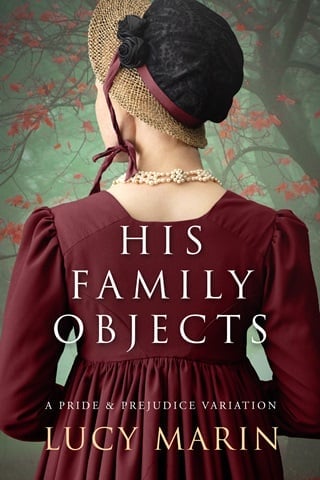Chapter 21
Elizabeth strode back to the house, intent on reaching it as quickly as possible. She barely managed to contain her strong emotions until she was alone in her chamber, having impatiently waved away the maid who had greeted her at the door. Her heart beat thunderously against her ribs, which almost felt as though they would bruise, and her hands shook such that it was difficult to undo the buttons of her coat.
What should she make of everything Mr Darcy had told her? Naturally, she believed him, but she immediately dismissed his claim that he would find a way for them to be together. She would never accept him without Miss Darcy’s full, freely given support, and that seemed unlikely to ever occur, given her understandable reluctance to have any tie to Mr Wickham.
How greatly Miss Darcy had suffered! Even when Elizabeth believed Mr Wickham had only deceived the young lady, she had pitied her, but with this new information, she longed to hold Miss Darcy within her protective embrace and act as a shield against the world which had treated her so cruelly. Briefly, she worried about Lydia married to a man who could behave in such a reprehensible manner, but at the present time, Mr Darcy’s disclosures took precedence. Later, she would decide whether there was anything she could do to assist Lydia should Mr Wickham show signs of abusing her.
Elizabeth’s mind took her back to the summer and meeting Miss Darcy. She had thought her exceedingly shy and even fearful at times. She recalled seeing her pulling her hair or squeezing her hands together until her knuckles were white—clear evidence of the girl wanting to harm herself, just as Mr Darcy had said. Elizabeth could not conceive of feeling so hurt, so unhappy that you wanted to cause yourself pain. What a dreadful way to live!
Elizabeth was angry and disappointed in Mr Darcy. Why had he not told her the truth when they talked in December? He had humiliated and misled her by not being more forthright. This last was particularly difficult to accept. If he had not waited so long to talk to her, leaving her to wonder why he had not come—she would still have been heartbroken, but she liked to believe she would have understood.
Part of Elizabeth’s anger was because she felt as though she was being punished for Lydia’s reckless actions. It was not a new sentiment, but it returned stronger than ever. She suffered for her sister’s thoughtless deeds and would in one fashion or another for the rest of her life because, distressingly, knowing how much Mr Darcy had given up for his sister, how far he would go to protect her well-being, Elizabeth loved him more than ever.
The Hursts and Miss Bingley returned to town the week after Easter, and Jane, Bingley, and Elizabeth set out to call on them at Mr Hurst’s town house in Grosvenor Square.
As the carriage slowed to a stop, Bingley said, “There is no escaping this visit or their company while we all remain in London. We shall see them as little as possible, and I promise you both that I shall not allow them to be unkind.”
His sullen manner showed how much his sisters’ behaviour towards Jane had injured him and how easy it was for those who were supposed to be our nearest and dearest loved ones to wound us. The realisation made Elizabeth think of the Darcys, though she could not blame either of them for hurting the other—him because he wished to marry a woman his sister did not like and her for being so unwell that he was required to put her needs above his own desires.
Mrs Hurst and Miss Bingley greeted Jane with what Elizabeth saw as obvious false sincerity, though she doubted her sister would recognise it.
“Are you not looking well? Your day dress is…pretty. Now that Caroline and I are in town, we shall take you to the best dressmakers and ensure your wardrobe does credit to my brother,” Mrs Hurst said.
“Going shopping together would be lovely. I am sure we can find a morning that suits us all, though I admit, I am terribly busy.” Jane smiled contentedly.
“Miss Eliza, I had no notion you intended to stay with my brother so long,” Miss Bingley said.
“Enough,” Bingley hissed. “I am very pleased to have Lizzy with us, and she is here because both Jane and I begged her to accept a home with us.”
Miss Bingley’s cheeks flushed, but she refrained from addressing Elizabeth or Jane again. While they drank tea and nibbled on lemon cake, the ladies told them of their time in Brighton. Jane spoke a little, but no one else did. The Bingleys and Elizabeth departed soon after, but not before Jane offered them an invitation.
“We are having a dinner party soon. I hope you will come.”
“Thank you. We shall be delighted,” Mrs Hurst said, though to Elizabeth’s ear, her tone did not match her words.
The dinner party was much like any other, in Elizabeth’s opinion. She enjoyed most of the company, which included Mr Grey and Miss Reed, two people she found it especially easy to talk to. The meal itself was delicious, the choice of dishes carefully considered, and the after-dinner entertainment amusing.
Mr Darcy was also in attendance. She hardly knew how to look at him, let alone speak to him, after their conversation in the park. During dinner, she sat beside Mr Grey, and she felt guilty because of the attention he was paying her. She imagined it injured Mr Darcy to see it. There was no denying that he still cared for her—loved her—but their situation was impossible.
Although they had greeted each other earlier, they did not speak until later in the evening. Finding herself alone, she had stepped into a corner where she was unlikely to be seen, assuring herself she was not deliberately seeking solitude in the hope that he would join her but suspecting that is exactly what she meant to do.
Sure enough, he was beside her almost at once. They said nothing for a long moment. She kept her eyes averted, peeking at him occasionally. Presently, her anger towards him was out of mind; all she could think of was how much he had to bear. Her fingers itched to reach for him, to comfort him, and she clasped her hands together to prevent herself from doing so.
“I…I hope you are well,” he said softly. “That you are not distressed after the other day.”
Knowing he must be referring to their conversation in the park, she said, “How could I not be? I am horrified by what your sister and family have had to endure.” And that my sister is married to such a man!
“I know you said it changes nothing, but do you not think we might find some way?”
She shook her head. “If there were such a way, you would have found it by now. Is Miss Darcy well? Does knowing you and I shall not marry help her?”
With evident reluctance, he nodded.
“I am glad for that. She must be your priority. That is why you did not return to me last autumn, and I understand,” she assured him sincerely. “It is better that we both accept that this is how our lives will be, as difficult as that is.”
They gazed into each other’s eyes until Elizabeth worried that she would act imprudently and turned away. Several minutes passed before she went to speak to someone else.
Elizabeth continued to spend time with Miss Reed and, in so doing, saw Lord Bramwell several times. He was always amiable, which was a marked contrast to Colonel Fitzwilliam, who tended to regard her coldly. She never saw Miss Darcy, though she did spy Lord and Lady Romsley at one event or another but was not introduced to them—until the afternoon she was walking in the park with Miss Reed. The couple and the viscount were walking towards them.
“Miss Reed, Miss Bennet, what a wonderful surprise to meet the two most charming young ladies in London on this fair day.” The viscount made an exaggerated bow and turned to his parents. “You remember Miss Reed, I am sure.”
“Naturally. I have known her father since we were boys. If you paid attention to what I said upon occasion, you might recall I mentioned having dinner with him last week.” Lord Romsley’s tone was droll, and there was a certain lightness in his demeanour that Elizabeth found agreeable.
Viscount Bramwell did not seem to hear his father’s remark and went on. “And this is Miss Elizabeth Bennet. Miss Reed and she have become good friends since they met earlier in the year, which does not surprise me in the least.”
“You seem to want one of us to ask why, and I shall, to spare the young ladies a measure of your teasing,” the countess said.
Lady Romsley was a tall, slender woman, with an air of confidence Elizabeth currently envied. She was used to thinking poorly of the couple, comparing them to Lady Catherine in her mind, but she could see that they were not the same. Consequently, she was embarrassed for having judged them before they had ever met. Would they have raised objections to her marrying Mr Darcy regardless of his sister’s health? If she made a good impression, would they think differently of the matter and encourage their niece to do likewise?
The earl chuckled, and Lord Bramwell added an awkward noise that might have been meant as a laugh.
“They are both admirable, as you would know if you knew them as well as I have come to, and I believe they have a great deal in common, besides being equals in beauty. They are each caring, well-informed ladies and not silly or conceited, as so many are.”
“I am very glad to hear it. Now, we ought to let them continue their walk. Miss Reed, it was lovely to see you again. Please give our regards to your mother and father,” Lady Romsley said. She regarded Elizabeth for a moment before adding, “Miss Bennet, it was a pleasure to meet you.”
Before they parted company, Lord Bramwell met Elizabeth’s eye and gave her a quick smile, leaving her once again with the impression that he did not share his family’s concerns regarding her connexion to Mr Darcy. He gave Miss Reed a longer look and one of a rather different character.
 Fullepub
Fullepub 



